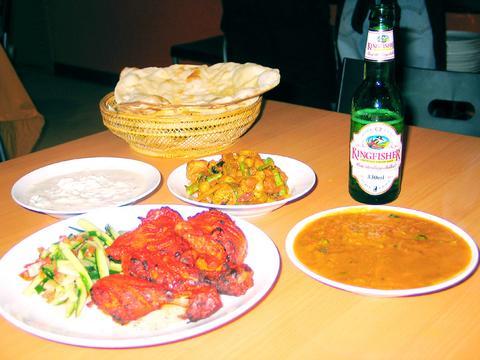Born and raised in India, Daniel Hsiung (熊懌騰) originally came to Taiwan to study Chinese cooking. After finishing cooking school and a few stints in various pub kitchens, Hsiung abandoned Chinese cuisine in favor of his native fare and opened The Spice Shop.
A fourth-generation Indo-Chinese, Hsiung is not the only member of his family to find success in the Indian restaurant business. In fact this is the sixth Spice Shop to open in Taiwan, as two cousins own and operate a total of five restaurants in Kaoshiung, Taichung and Hsinchu.

PHOTO: DIANA FREUNDL, TAIPEI TIMES:
Offering a large selection of vegetarian and non-vegetarian dishes, The Spice Shop serves up curry favorites such as beef madras (beef in coconut sauce), chicken tikka masala, mutton bhuna (mutton with onion and pepper) and others priced under NT$300 each. The most popular and highly recommended dish is the chicken tandoori (NT$300), served with a small side of kuchember (spicy Indian salad).
The vegetarian selection is equally plentiful and tasty. Made with seasonal vegetables the jhalfraizie (NT$180) is a refreshing change from the frozen veggies often used in mixed curry. Channa masala (chickpea curry), palak paneer (made with spinach and homemade cheese) and the daal all come highly recommended at NT$180.
Diners looking to satisfy a sweet craving after their curry will have to settle on a lassi, as there are no desserts on the menu. The mango lassi, made with fresh mango and yogurt, however, should not be overlooked.
The restaurant's decor remains debatable with a limited (yet eye-catching) selection of Indian tapestries hanging on exceptionally bright orange walls, with spindly chip board tables and plastic chairs.
A trained chef, Hsiung says he still prefers to be in the kitchen and still does most of the cooking. Apart from using less oil and chili, which can be increased on request, Hsiung claims he doesn't cater to Chinese or Western tastes, and instead prepares the food exactly as he would in India.
In less than two years since opening, The Spice Shop has acquired a substantial number of regulars who fill the tiny establishment nightly. With a maximum seating capacity of 40 persons, the restaurant fills up early, so reservations are not a bad idea, especially on the weekends.
Even at full capacity the wait for food is not intolerable and rather enjoyable with a selection of beers that includes India's own, King Fisher. Alternatively, patrons can bring their own bottle of wine, but are required to pay a NT$200 corkage charge.

Taiwan has next to no political engagement in Myanmar, either with the ruling military junta nor the dozens of armed groups who’ve in the last five years taken over around two-thirds of the nation’s territory in a sprawling, patchwork civil war. But early last month, the leader of one relatively minor Burmese revolutionary faction, General Nerdah Bomya, who is also an alleged war criminal, made a low key visit to Taipei, where he met with a member of President William Lai’s (賴清德) staff, a retired Taiwanese military official and several academics. “I feel like Taiwan is a good example of

March 2 to March 8 Gunfire rang out along the shore of the frontline island of Lieyu (烈嶼) on a foggy afternoon on March 7, 1987. By the time it was over, about 20 unarmed Vietnamese refugees — men, women, elderly and children — were dead. They were hastily buried, followed by decades of silence. Months later, opposition politicians and journalists tried to uncover what had happened, but conflicting accounts only deepened the confusion. One version suggested that government troops had mistakenly killed their own operatives attempting to return home from Vietnam. The military maintained that the

Before the last section of the round-the-island railway was electrified, one old blue train still chugged back and forth between Pingtung County’s Fangliao (枋寮) and Taitung (台東) stations once a day. It was so slow, was so hot (it had no air conditioning) and covered such a short distance, that the low fare still failed to attract many riders. This relic of the past was finally retired when the South Link Line was fully electrified on Dec. 23, 2020. A wave of nostalgia surrounded the termination of the Ordinary Train service, as these train carriages had been in use for decades

Lori Sepich smoked for years and sometimes skipped taking her blood pressure medicine. But she never thought she’d have a heart attack. The possibility “just wasn’t registering with me,” said the 64-year-old from Memphis, Tennessee, who suffered two of them 13 years apart. She’s far from alone. More than 60 million women in the US live with cardiovascular disease, which includes heart disease as well as stroke, heart failure and atrial fibrillation. And despite the myth that heart attacks mostly strike men, women are vulnerable too. Overall in the US, 1 in 5 women dies of cardiovascular disease each year, 37,000 of them